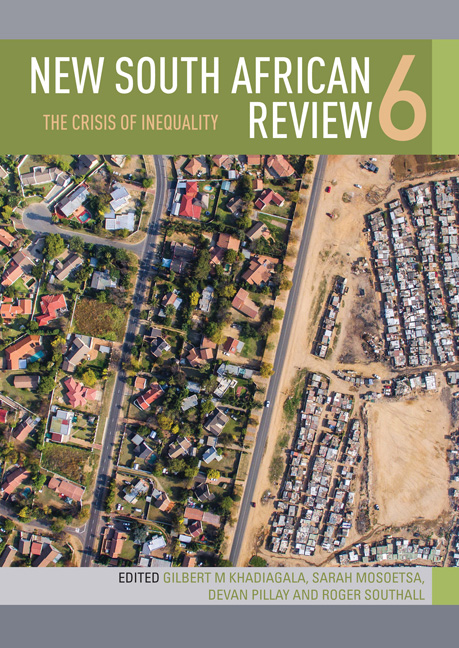Book contents
- Frontmatter
- Contents
- List of tables and figures
- INTRODUCTION: The global crisis of inequality and its South African manifestations
- PART 1 INEQUALITY AND CLASS: POLARITIES AND POLICIES
- PART 2 THE POLITICS OF INEQUALITY
- PART 3 SOCIAL DIMENSIONS OF INEQUALITY
- CHAPTER 8 Analysis must rise: A political economy of falling fees
- CHAPTER 9 Education, the state and class inequality: The case for free higher education in South Africa
- CHAPTER 10 Still waiting: The South African government's pending promise of equality for people with disabilities
- CHAPTER 11 Big fish in small ponds: Changing stratification and inequalities in small towns in the Karoo region, South Africa
- PART 4 LAND AND ENVIRONMENT
- Contributors
- Index
CHAPTER 8 - Analysis must rise: A political economy of falling fees
from PART 3 - SOCIAL DIMENSIONS OF INEQUALITY
Published online by Cambridge University Press: 23 March 2018
- Frontmatter
- Contents
- List of tables and figures
- INTRODUCTION: The global crisis of inequality and its South African manifestations
- PART 1 INEQUALITY AND CLASS: POLARITIES AND POLICIES
- PART 2 THE POLITICS OF INEQUALITY
- PART 3 SOCIAL DIMENSIONS OF INEQUALITY
- CHAPTER 8 Analysis must rise: A political economy of falling fees
- CHAPTER 9 Education, the state and class inequality: The case for free higher education in South Africa
- CHAPTER 10 Still waiting: The South African government's pending promise of equality for people with disabilities
- CHAPTER 11 Big fish in small ponds: Changing stratification and inequalities in small towns in the Karoo region, South Africa
- PART 4 LAND AND ENVIRONMENT
- Contributors
- Index
Summary
This chapter explores some of the complexity of the debates around the funding of higher education in South Africa, and how it intersects with inequality – both counteracting and complicit in increasing inequalities in society. The specific context is student protests, under the banner of #FeesMustFall, which rocked universities in South Africa in 2015 and 2016, and seem likely to continue in 2017. The chapter argues that while there are convincing principled arguments for fee-free higher education as a mechanism to create equality in the student body, as well as to decommodify higher education, doing away with a component of fee payments for university education in contemporary South Africa could leave most if not all stakeholders in South African universities today with worse outcomes, and may aggravate inequality. This is based on two analyses that have been inadequately dealt with in the current debates. The first is that while elite higher education systems are politically untenable in democratic societies, mass higher education systems play into labour market inequalities in complex ways, and massification has negative as well as positive effects on society. The second is that the unintended consequence of doing away with fees is likely to be a substantial weakening of our top institutions, with – if the arguments for the public good role of higher education hold – negative consequences for society overall.
OVERVIEW OF THE PROTESTS AND RESPONSES TO THEM
South Africa's university system is located in a context of extreme and widespread poverty; extreme inequality; a racialised labour market with a historic and current built-in dependence on cheap labour; extremely high unemployment; high levels of insecure work; and widespread dissatisfaction with the government. Admission to university education has expanded dramatically over the past twenty years. Funding from the fiscus has risen in real terms, but higher education inflation has risen faster than inflation in general, in part due to a weak exchange rate, and expansion has seen large numbers of poor and poorly prepared students enter the system (DHET 2016). In short, a crisis has long been brewing in the university system.
Despite some aspects peculiar to South Africa, many of the trends in South African higher education are typical of an international picture. Participation in higher education has dramatically expanded around the world in the last two decades (Schofer and Meyer 2005).
- Type
- Chapter
- Information
- New South African Review 6The Crisis of Inequality, pp. 152 - 166Publisher: Wits University PressPrint publication year: 2018



